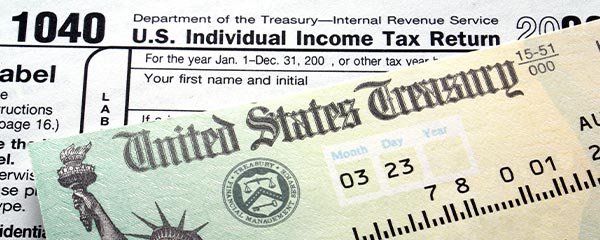PRINCETON, NJ -- A majority of Americans (58%) say money and wealth should be more evenly distributed among a larger percentage of the people, although slightly less than half (46%) go so far as to say that the government should redistribute wealth by "heavy taxes on the rich."
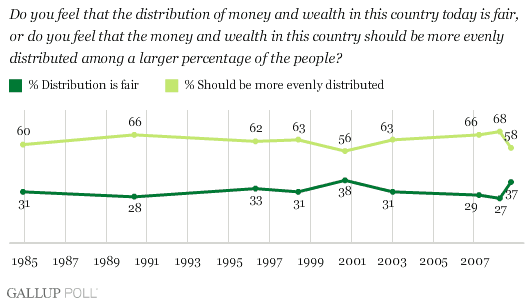
Gallup has been asking Americans periodically for over 20 years whether the distribution of money and wealth in this country is "fair," or whether they should be "more evenly distributed among a larger percentage of the people." (The question wording does not include a reference to exactly how they would be more evenly distributed and does not mention the government.)
Across the nine times the question has been asked, a majority of Americans have agreed with the thought that money and wealth should be more evenly distributed. The current 58% who agree is one of the two lowest percentages Gallup has measured (along with a 56% reading in September 2000). Sixty-eight percent agreed in April of this year and 66% in April 2007.
The responses to this question are extraordinarily differentiated by partisan orientation, reflecting a fundamental fissure in Americans' views on this money/wealth distribution concept.
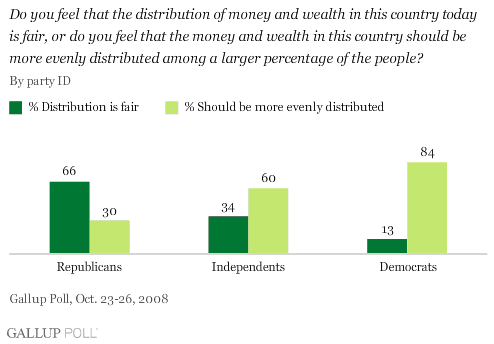
Just 30% of Republicans say there should be a more even distribution of money and wealth, compared to 60% of independents and an overwhelming majority of 84% of Democrats.
The sentiment that money and wealth should be more evenly distributed does not address the issue of exactly how this objective would be achieved. One of the more contentious points on the presidential campaign trail in recent weeks has been John McCain's continuing assertion that Barack Obama's tax plan, which would involve higher taxes for high-income families, is "redistributionist," with some McCain supporters going so far as to argue that Obama's tax plans would be "socialist." These disputes focus on the longtime argument in economic and political philosophy over government's ideal role, if any, in attempting to redistribute money and wealth through the use of taxes.
Gallup has from time to time asked a question that addresses this issue in part -- a question that Roper first asked in a Fortune Magazine survey conducted in March 1939, near the end of the Depression. The question is phrased as follows: "People feel differently about how far a government should go. Here is a phrase which some people believe in and some don't. Do you think our government should or should not redistribute wealth by heavy taxes on the rich?"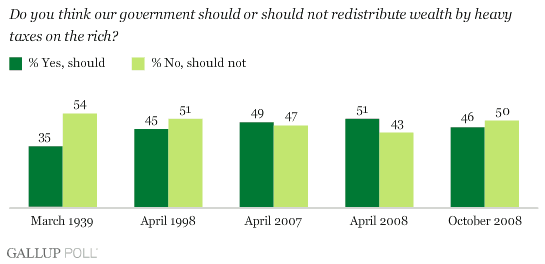
This question is notable because it directly invokes the idea that government should intervene and redistribute wealth through taxes on the rich. The question phrase "heavy taxes on the rich" is certainly not one the Obama campaign would choose to describe its plan, which Obama repeatedly says would return high income tax rates only back to where they were under Bill Clinton in the 1990s, before the Bush administration tax cuts. Still, the question generally addresses the basic issue of taxing high-income individuals to transfer wealth in a society.
Gallup has asked this question only four times over the last decade, and, in a broad sense, sentiment has been split every time. In 1998, there was a slight tilt toward the negative response; in 2007, sentiment was split almost equally; in April of this year, there was a slight tilt toward the positive response; and in the current poll, sentiment is more evenly split, with a slight tilt back toward the negative.
Still, in each of the four times Gallup has asked this question in recent years, between 45% and 51% of Americans have gone so far as to agree with the fairly harsh-sounding policy of "redistribut[ing] wealth by heavy taxes on the rich." Although the survey methods used now certainly differ in a number of ways from those for surveys conducted in 1939, the trend lines at least suggest that Americans are currently as willing as, if not more willing than, they were during the Depression to sanction the use of taxes on the rich as a mechanism for redistributing wealth.
Again, there are big differences by partisan orientation in response to this question.
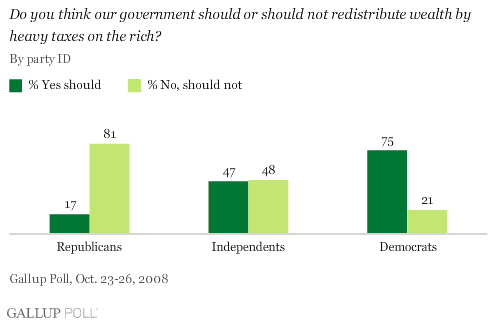
Republicans overwhelmingly reject the concept, independents are split down the middle, and Democrats strongly support it.
Americans' responses to the two income-redistribution questions can be combined, with results in the accompanying graph.
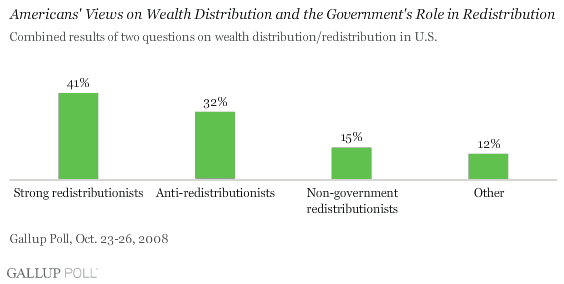
This combination of the responses to the two questions allows the classification of Americans into broad groups as follows:
- Forty-one percent of Americans are "strong redistributionists" -- those who say money and wealth should be more evenly distributed and that the government should do so with heavy taxes on the rich.
- Thirty-two percent are "anti-redistributionists" -- those who say the current distribution of money and wealth is fair and who oppose heavy taxes on the rich.
- Fifteen percent are "non-government redistributionists" -- those who say money and wealth should be more evenly distributed, but that the government should not attempt to do so with heavy taxes on the rich.
The rest of the sample either gives the ambiguous response that the distribution is fair but that government should tax the rich (4%), or gives a "don't know" response to one of the questions.
Implications
Perhaps the most important implication of these data is the extraordinary partisan differences found in responses to both questions dealing with money and wealth distribution in this country. Democrats believe that wealth should be more evenly distributed, and that this redistribution should be accomplished by heavy taxes on the rich. Although Obama has not advocated what he would call "heavy" taxes on the rich, the general sentiment that taxes on high-income families should be increased in order to help provide tax relief for those making less money is a part of his campaign platform.
Republicans fairly strongly reject both the concept that the current distribution of money and wealth is unfair and the idea of imposing heavy taxes on the rich. In this, they certainly reflect the campaign statements and platform of McCain.
Independents, the most crucial group in a close election, are more ambivalent -- as one would expect. Independents swing to the Democratic side in their majority (60%) belief that the distribution of money and wealth is not fair and should be more even, but split almost exactly evenly on the concept of heavy taxes on the rich.
Survey Methods
Results are based on telephone interviews with 1,010 national adults, aged 18 and older, conducted Oct. 23-26, 2008. For results based on the total sample of national adults, one can say with 95% confidence that the maximum margin of sampling error is ±3 percentage points.
For results based on the 511 national adults in the Form A half-sample and 499 national adults in the Form B half-sample, the maximum margins of sampling error are ±5 percentage points.
For results based on the sample of 957 registered voters, the maximum margin of sampling error is ±3 percentage points.
Interviews are conducted with respondents on land-line telephones (for respondents with a land-line telephone) and cellular phones (for respondents who are cell-phone only).
In addition to sampling error, question wording and practical difficulties in conducting surveys can introduce error or bias into the findings of public opinion polls.
